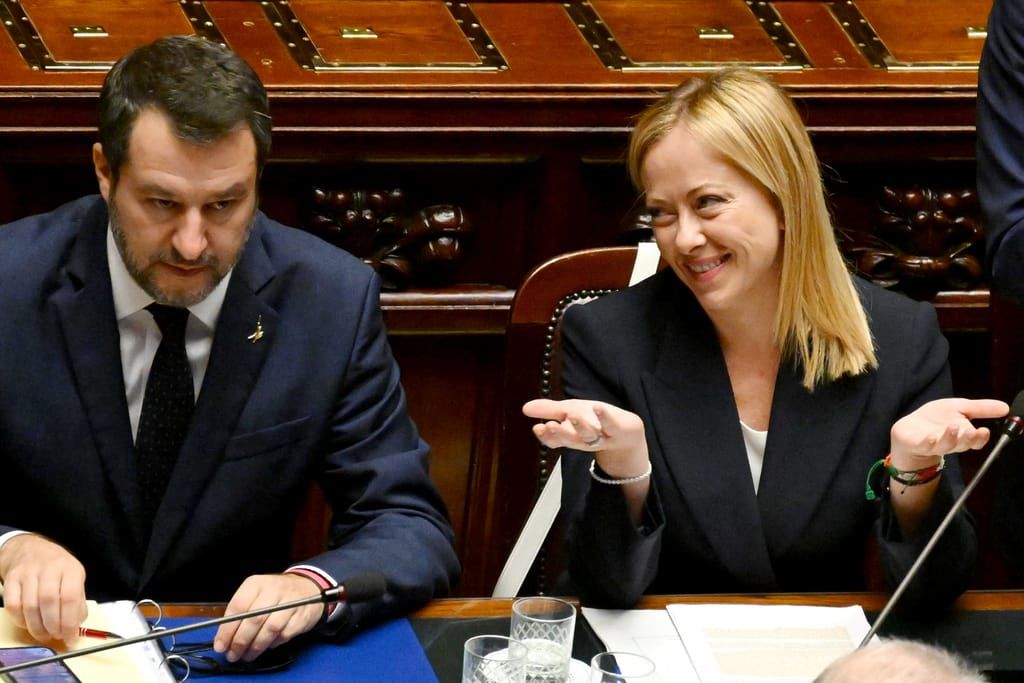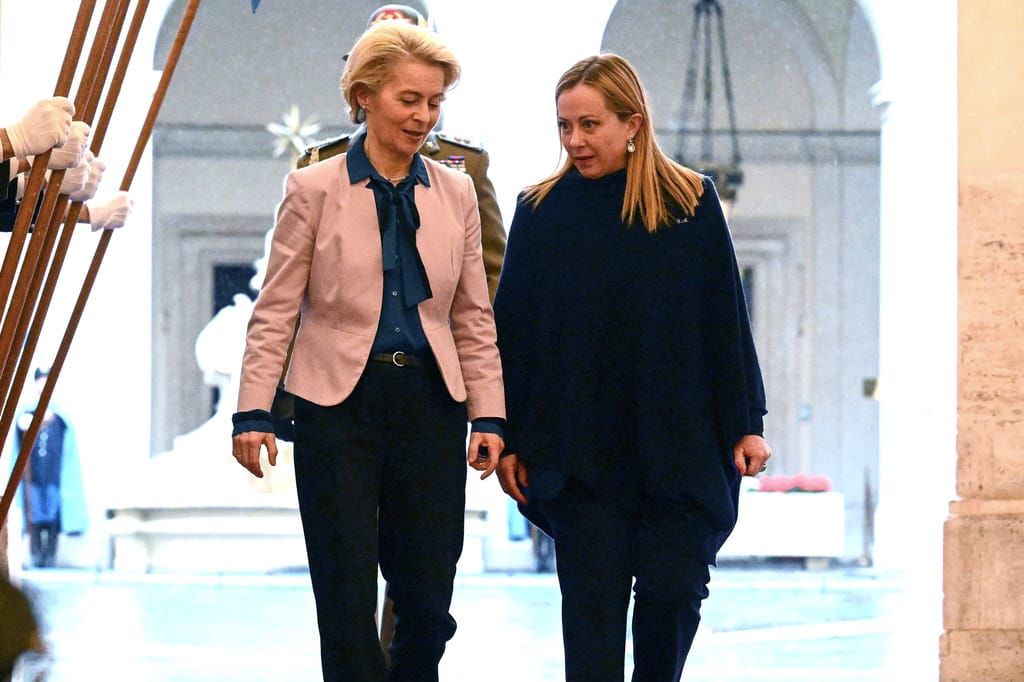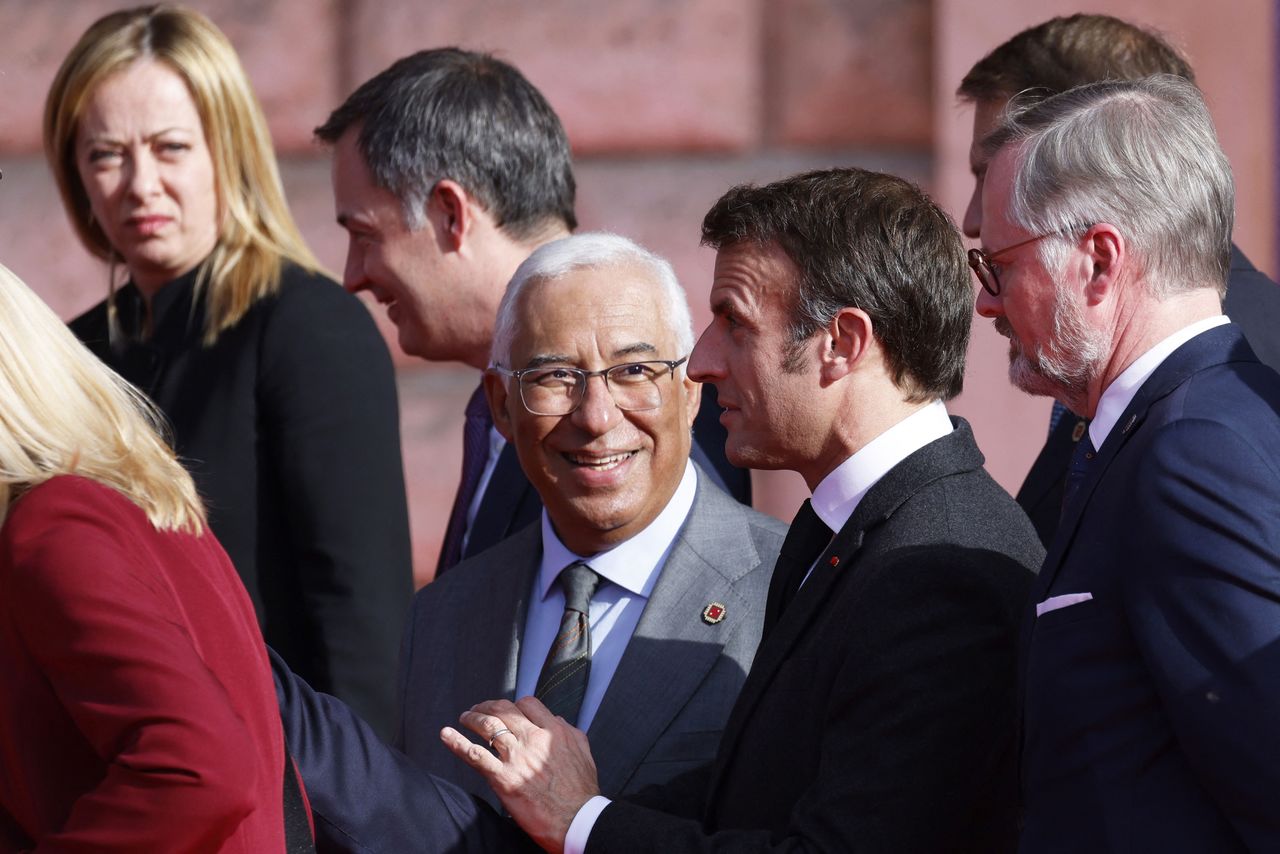
Europe’s conservatives want a piece of Giorgia Meloni
With European socialists reeling over the Qatargate scandal, the Continent’s mainstream conservatives are plotting to join forces with hard-right politicians they hope will help them keep power in Brussels for years to come.
Nobody is more central to their plans than Italian Prime Minister Giorgia Meloni.
While the 46-year-old has freaked out mainstream politicians due to her hard-line stance on migration, comments praising fascism when she was younger, and links to hardcore right-wing figures, the EU’s top conservative politicians are quickly getting over their qualms as they look ahead to 2024, when the bloc elects a new European Parliament and reshuffles its upper ranks.
In recent months, top conservatives including European Commission President Ursula von der Leyen, European People’s Party (EPP) chief Manfred Weber and European Parliament President Roberta Metsola have spent hours, collectively, in one-on-one meetings with the Italian premier, much of it on her home turf in Rome.
The idea, according to European conservatives and people in Meloni’s entourage, is to bring her into a right-wing alliance that would have enough clout in the Parliament and European Council to weigh on the nomination of top EU jobs, while partly compensating for the loss of German Chancellor Angela Merkel from the conservative camp.
There’s a big prize in store if they succeed: Most of the top jobs at the EU’s key institutions will be up for grabs after the election — from Commission president to head of European Council, from leadership of the European Parliament to head of the EU’s diplomatic arm.
The EPP — an umbrella group of center-right political parties ranging from former German Chancellor Angel Merkel’s Christian Democrats to former Italian Prime Minister Silvio Berlusconi’s Forza Italia — has traditionally played an outsize role in EU politics. Despite the loss of Merkel, its most powerful member, the party still controls the Commission and Parliament, where it is the biggest force, sharing power with the Socialists but also, depending on the issue, with the liberal Renew group and the Greens.
Meloni, on the other hand, is president of the European Conservatives and Reformists (ECR), a fiery upstart. Founded in 2009, it’s more right-wing than the bigger EPP group and includes parties like the far-right Sweden Democrats, Spain’s Vox and Meloni’s Brothers of Italy, all of them anti-immigration hard-liners.
While the EPP has suffered big losses, including in France and Germany, the ECR is growing. For the more established party, embracing the upstart is an opportunity to reclaim some of the power that has ebbed away. But it’s also a risk, if an alliance empowers loud, radical voices — think Donald Trump and the Republican Party in the U.S. — that drown out the centrist leadership.
For now, the top figures in the EPP don’t seem worried.
“There can certainly be an alliance, perhaps extended to the liberals,” Italian Deputy Prime Minister Antonio Tajani said earlier this month, referring to the EPP and the ECR, as well as to the liberals of the Renew group, whose most powerful member is French President Emmanuel Macron.
 Giorgia Meloni shares her government with Forza Italia, as well as the League, Matteo Salvini’s far-right party
Giorgia Meloni shares her government with Forza Italia, as well as the League, Matteo Salvini’s far-right party
Asked about the potential for a tie-up with Meloni, EPP Secretary-General Thanasis Bakolas told POLITICO he was “keeping an open mind. I want to increase my tent … I don’t understand why I can’t play this political game like it’s played in every other country.”
Grumbles
Other EPP members are more skeptical.
For Polish conservatives in the EPP, for example, joining forces with the ECR would be “suicide” as it would mean teaming up with their enemies, the hard-right anti-EU Law and Justice party ahead of elections in the fall. “We want a stronger Europe,” said Andrezj Halicki, head of Poland’s delegation to the EPP. “They [Law and Justice] want a weaker Europe. There is no bridge.”
Germany’s Christian Democrats are also wary of a tie-up.
Some critics worry an EPP-ECR alliance could pave the way for Euroskeptic politicians to win top jobs at European institutions, bringing the fox into the proverbial henhouse and breaking a so-called cordon sanitaire, which has kept far-right figures out of power in Europe for decades.
Hence the careful language from conservative officials about a potential alliance. They don’t want to poach Meloni from the ECR, they say. Nor do they want a formal alliance, as long as Law and Justice is in the picture. Instead, according to a senior EPP official who asked not to be named, “the question is whether we should talk to her [Meloni].”
 During a recent trip to Rome, Von der Leyen spent more than an hour with Giorgia Meloni at her government headquarters
During a recent trip to Rome, Von der Leyen spent more than an hour with Giorgia Meloni at her government headquarters
This EPP-ECR cooperation could then change the balance of power in both the European Parliament and the European Council where leaders meet.
“In her first meeting at the Council table, she supported to cut money for Viktor Orbán,” the senior EPP official added, referring to Hungary’s prime minister who is engaged in a showdown with the EU over the rule of law. “I really think we have to look at this to move to the center and see how we can talk together.”
Whatever the nature of any alliance, this much is clear: In Italy, Meloni is very much in the driver’s seat, towing along mainstream conservatives. And although this will be hard to replicate at EU level where the EPP is expected to remain stronger than the ECR, her move toward the center is aimed at changing the nature of the EU.
“Italy has become the laboratory of the right-center, where the right is leading and the moderates of the EPP are pulled along,” said Marco Damilano, a political analyst who has a show on Rai, Italy’s state-owned TV.
“Nationalists like Meloni move toward the EU — but toward the EU they have in mind,” he added. In other words: more limited powers for Brussels and less federalism.
When in Rome
Before going any further with Meloni, however, conservatives are intent on ensuring that she’s aligned with them on continued EU support for the war in Ukraine and the all-important matter of migration.
On the first score, EPP officials are reassured by the fact that Meloni has appointed a former NATO ambassador, Francesco Talò, as her diplomatic adviser.
On the latter point of migration, it’s a trickier equation. The EU is bracing for further waves of migrants in coming months, amid contentious plans to reform asylum rules that would formalize how the bloc’s external borders are protected and how migrants who do enter are distributed between countries.
If Meloni splits with EPP leaders over migration, for example by creating a new crisis over migrant arrivals, that could dynamite their well-laid plans for an alliance. There are also concerns about the fact that she belongs to a hard-right party, the Brothers of Italy, that could yank her to the right on matters like LGBTQ rights — or her closeness to Europe’s enfant terrible, Orbán.
Hence the intensive efforts by conservative leaders to spend time with her ahead of a Council of the EU gathering in Brussels on February 9-10.
During a recent trip to Rome, whose stated aim was to deliver a speech for former European Parliament President David Sassoli, von der Leyen spent more than an hour with Meloni at her government headquarters. The Italian’s office hailed the meeting as an “excellent opportunity for an exchange of views” ahead of a gathering of European leaders in February, and the Commission president called it a “pleasure” on Twitter.
The encounter came days after Weber, head of the EPP, huddled with Meloni on the sidelines of Pope Benedict’s funeral in Rome, and just a few weeks after Meloni met with Metsola, president of the European Parliament, in Brussels. For both Brussels bigwigs, it was the second meeting with the Italian leader.
Indeed, for people in Meloni’s entourage, Metsola is a key character in any possible tie-up between the EPP and the ECR. “Metsola is a bridge figure [with the EPP] at the level of values. She’s a conservative and it comes easily to find in her the point of balance between our group and the EPP,” said Nicola Procaccini, a Brothers of Italy MEP very close to Meloni.
Many officials in Brussels say they expect her to be the ECR-EPP candidate for the position of European Commission president — an alliance that has already proved its value in Parliament.
Metsola herself was elected with the support of the ECR, as was her former chief of staff, Alessandro Chiocchetti, for the role of secretary-general of the Parliament.
End of EU as we know it?
The big remaining question is whether the support of ECR figures such as Meloni would be enough to consolidate the right’s power in Brussels — or whether they would have to look further afield. In Parliament, even with Meloni’s party rallied behind it, the EPP would still be short of a majority, according to current projections by POLITICO’s Poll of Polls.
The right-wing bloc would need wider support — for example from Macron’s centrist Renew party. “His government is basically center-right, I wouldn’t rule out that Macron would put his hat on a possible election of Metsola” as head of the Commission with the backing of ECR, said an EU official.
A spokesperson for the Renew group denied this possibility. “We will always fight for a pro-European coalition. That it is not negotiable,” said the spokesperson. “Despite the rise of populist parties, Renew Europe believes elections are won in the center.”
 Relations between Meloni’s government and France have gotten off to a
dismal start due to a row over a migrant ship that Meloni had refused to
let dock in Italy
Relations between Meloni’s government and France have gotten off to a
dismal start due to a row over a migrant ship that Meloni had refused to
let dock in Italy
In any case, managing such a broad alliance could prove challenging. Relations between Meloni’s government and France have gotten off to a dismal start due to a row over a migrant ship that Meloni had refused to let dock in Italy. Still, there are signs of movement following a phone call last week between Macron and Meloni.
For Meloni, too, there could be an upside to becoming allies with the EPP. With record public debt, Italy needs the kind of EU support a tie-up could offer. Being strong in Rome and weak in Brussels “could be deadly” for her, said Damilano, the Italian political analyst.











